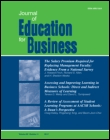
Journal of Education for Business
Scope & Guideline
Bridging Theory and Practice in Business Education
Introduction
Aims and Scopes
- Business Education Pedagogy:
The journal emphasizes innovative teaching methods and pedagogical strategies that enhance student engagement and learning outcomes in business education. - Curriculum Development:
Research on curriculum design and implementation is a core area, focusing on aligning educational programs with industry requirements and student needs. - Experiential Learning:
The journal highlights the importance of experiential learning approaches, including case studies, simulations, and project-based learning, to bridge the gap between theory and practice. - Technology Integration:
There is a consistent focus on the integration of technology in business education, including the use of online tools, digital resources, and innovative assessment methods. - Diversity and Inclusion in Business Education:
The journal addresses issues related to diversity, equity, and inclusion within business education, promoting research that explores these themes and their impact on student experiences. - Assessment and Evaluation:
Research focused on assessing educational outcomes, program effectiveness, and student performance in various business disciplines is a significant aspect of the journal.
Trending and Emerging
- Mental Health and Wellbeing:
Recent publications have shown a growing interest in mental health and wellbeing among students, recognizing the importance of psychological factors in academic performance and career preparedness. - Entrepreneurship Education:
There is a notable increase in research examining entrepreneurship education, particularly its impact on student intentions and competencies, as business schools aim to foster entrepreneurial mindsets. - Technology and AI in Education:
Emerging themes around the use of artificial intelligence and other technologies in education are gaining traction, exploring how these tools can enhance teaching and learning experiences. - Sustainability and Social Responsibility:
The integration of sustainable development goals (SDGs) and social responsibility into business curricula is increasingly prevalent, reflecting a broader societal shift towards responsible business practices. - Diversity, Equity, and Inclusion Initiatives:
Research focusing on diversity, equity, and inclusion within business education is on the rise, highlighting the need for inclusive practices and curricula that cater to diverse student populations. - Experiential Learning Innovations:
There is a trend towards innovative experiential learning approaches, such as gamification and simulation-based learning, which are being increasingly recognized for their effectiveness in engaging students.
Declining or Waning
- Traditional Teaching Methods:
There has been a noticeable decrease in research focusing on traditional, lecture-based teaching methods as the journal increasingly emphasizes innovative and interactive pedagogies. - Narrowly Defined Disciplinary Focus:
Research that strictly adheres to traditional disciplinary boundaries (e.g., finance or accounting in isolation) is becoming less common, as interdisciplinary approaches gain traction. - Static Assessment Techniques:
There is a decline in papers that advocate for static assessment methods, such as standardized testing, as the focus shifts towards more dynamic and formative assessment strategies. - Purely Theoretical Studies:
Studies that do not incorporate practical applications or empirical evidence are seeing reduced publication frequency, reflecting a preference for research that demonstrates real-world relevance. - Limited Engagement with Industry:
Research lacking direct engagement with industry stakeholders or practical applications in business settings is becoming less favored, as the journal seeks to bridge academic research with industry practices.
Similar Journals

Medical Science Educator
Elevating teaching practices with cutting-edge insights.Medical Science Educator, published by SpringerNature, is an esteemed journal committed to advancing the intersection of educational methodologies and medical science. With a significant impact in its field, this journal holds a Q2 ranking in both Education and Medicine (miscellaneous) categories as of 2023, reflecting its dedication to high-quality research and scholarly dialogue. Operating in a digital format, the journal uniquely facilitates access to pivotal studies from its inception in 2011 until 2024, fostering innovation in medical education. The latest rankings highlight its credibility, placing it at the 63rd percentile in Social Sciences - Education and the 56th percentile in Medicine - Medicine (miscellaneous) within Scopus. This platform serves as an invaluable resource for educators, researchers, and practitioners aiming to enhance teaching practices and shape the future of medical education.
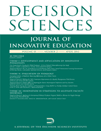
Decision Sciences-Journal of Innovative Education
Advancing the dialogue between education and decision-making excellence.Decision Sciences - Journal of Innovative Education is a prestigious academic journal published by WILEY, focusing on the intersecting fields of decision sciences, education, and management. With an ISSN of 1540-4595 and an E-ISSN of 1540-4609, this journal offers valuable insights and research findings aimed at fostering innovative educational practices and decision-making processes. As of 2023, it boasts an impressive Q2 ranking in several categories, including Business, Management and Accounting, Decision Sciences, and Education. This positions it within the top tier of journals in its field, reflecting its commitment to high-quality scholarship. Researchers and educators benefit from its extensive coverage of contemporary topics and methodologies, making it a vital resource for those seeking to enhance their understanding and application of innovative strategies in education. Although it does not currently offer open access, the journal remains accessible via institutional subscriptions, ensuring that its impactful research is readily available to a broad audience. The journal's scope spans from 2011 to 2024, allowing for a comprehensive exploration of evolving trends in decision sciences and education.
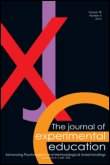
JOURNAL OF EXPERIMENTAL EDUCATION
Exploring the frontiers of developmental and educational psychology.Journal of Experimental Education, published by Routledge Journals, Taylor & Francis Ltd, is a prestigious platform dedicated to advancing the field of educational research. With an impressive history spanning from 1932 to 2024, this journal covers significant developments in Developmental and Educational Psychology and Education, achieving a Q1 ranking in both categories for 2023. The journal is recognized for its rigorous peer-reviewed articles that explore innovative experimental methodologies and empirical studies that shape contemporary practices in education. Current Scopus rankings further establish its credibility, placing it in the top percentiles among its peers. While it is not an open-access journal, the insights offered through its publications are invaluable for researchers, educators, and students seeking to deepen their understanding of educational phenomena and improve pedagogical approaches. By fostering a community dedicated to research excellence, the Journal of Experimental Education serves as an essential resource for those committed to the advancement of education.
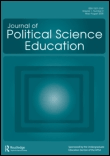
Journal of Political Science Education
Elevating Political Science Education for AllThe Journal of Political Science Education is a distinguished peer-reviewed journal published by Routledge Journals, Taylor & Francis Ltd, based in the United Kingdom. Since its inception in 2005, this journal has been dedicated to advancing research and discourse at the intersection of political science and education, offering insightful analyses and innovative pedagogical practices to enhance the teaching and learning of political science. As a reputable journal in the field, it is currently indexed in the Scopus database, holding a prestigious position within the top quartiles (Q2) in both Education and Sociology and Political Science categories. The journal aims to foster a vibrant scholarly community, encouraging contributions that promote critical thinking and engagement in political issues among students and educators alike. With an emphasis on accessibility and impact, the Journal of Political Science Education serves as a vital resource for researchers, educators, and practitioners seeking to enhance their understanding of the educational frameworks that shape political science knowledge and civic engagement.

JOURNAL OF FURTHER AND HIGHER EDUCATION
Exploring New Frontiers in Higher LearningJournal of Further and Higher Education, published by Routledge Journals, Taylor & Francis Ltd, stands as a prominent platform in the field of education, with a distinguished focus on further and higher education studies. With an ISSN of 0309-877X and E-ISSN of 1469-9486, this journal has been contributing invaluable insights since its inception in 1977. The journal boasts a remarkable Q1 ranking in its category for 2023, placing it in the top tier of educational research, underscored by its 83rd percentile ranking among Scopus Ranks in Social Sciences - Education. Researchers and practitioners alike are encouraged to submit their work, as the journal aims to foster innovative discussions and disseminate high-quality scholarly articles that address contemporary challenges in further and higher education. With its commitment to academic excellence, Journal of Further and Higher Education plays a crucial role in shaping policy and practice in the educational landscape, ensuring that the voices of educators and learners are heard and valued.
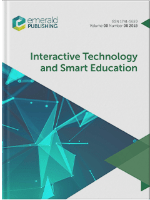
Interactive Technology and Smart Education
Advancing knowledge in the realm of interactive learning.Interactive Technology and Smart Education is a leading academic journal published by EMERALD GROUP PUBLISHING LTD, dedicated to exploring the dynamic intersection of technology and education. With a robust impact factor signifying its significant contributions to the field, this journal consistently ranks in the Q1 quartile in categories such as Computer Science (Miscellaneous), Education, and E-learning, reflecting its prestige and wide-ranging influence. A staple for researchers, educators, and industry professionals, the journal addresses innovative practices and developments in interactive technologies that enhance teaching and learning experiences. Operating from its base in the United Kingdom, the journal spans nearly two decades of impactful publishing, featuring high-quality research that plays a crucial role in shaping the future of education through technology. Scholars seeking to stay at the forefront of this evolving field are encouraged to contribute and engage with the journal's pioneering work.
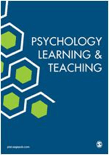
Psychology Learning and Teaching-PLAT
Transforming teaching practices with empirical evidence.Psychology Learning and Teaching (PLAT) is a distinguished academic journal published by SAGE Publications Ltd, dedicated to advancing the field of educational psychology. With an ISSN of 1475-7257 and an E-ISSN of 2057-3022, this journal serves as a vital resource for researchers, educators, and practitioners seeking to explore innovative teaching methodologies and learning strategies within the context of psychology. As of 2023, its reputation is underscored by its Q1 ranking in Education and Q2 ranking in Psychology (miscellaneous), reflecting its significant contributions to the scholarly community. Placing an emphasis on empirical research and practical application, PLAT publishes research that not only enhances educational practices but also addresses contemporary psychological issues. Open access options facilitate widespread dissemination of knowledge, while its robust impact factor highlights its influence within the educational and psychological discourse. This journal is essential for anyone committed to the intersection of psychology and education, providing thought-provoking insights that inspire ongoing dialogue and development in the field.

International Journal of Technology in Education
Shaping Tomorrow's Classrooms with Today’s TechnologyThe International Journal of Technology in Education, published by the International Society for Technology Education & Science (ISTES), serves as a vital platform for researchers, educators, and practitioners devoted to the intersection of technology and educational practices. With an E-ISSN of 2689-2758, this journal aims to showcase innovative research, case studies, and theoretical contributions that explore how emerging technologies can enhance teaching and learning. Although specific metrics like impact factor and HIndex are currently unavailable, the journal is committed to rigorous peer review and high academic standards, ensuring that all published work contributes meaningfully to the evolving landscape of educational technology. As an open-access journal, it strives to make research widely available, fostering collaboration and knowledge sharing among its audience. Whether you are a researcher exploring new horizons or a professional seeking practical applications of technology in education, the International Journal of Technology in Education is an indispensable resource.

Brock Education-A Journal of Educational Research and Practice
Fostering Dialogue for Educational Advancement and ImpactBrock Education: A Journal of Educational Research and Practice is a distinguished academic platform published by Brock University, Faculty of Education, focusing on the evolving landscape of education through rigorous research and practical insights. Since its inception in 1999, this Open Access journal has facilitated the dissemination of knowledge, ensuring that educators, researchers, and policymakers can readily access impactful studies that inform and inspire educational practices across Canada and beyond. With a commitment to fostering dialogue around innovative teaching methodologies, curriculum development, and educational policy, Brock Education plays a pivotal role in promoting evidence-based practices in the educational field. By providing a forum for diverse perspectives and collaborative research, the journal aims to enhance the quality of education at all levels, making it an essential resource for those invested in the future of learning.

Pegem Egitim ve Ogretim Dergisi
Empowering Educators with Cutting-Edge ResearchPegem Egitim ve Ogretim Dergisi is a prominent academic journal published by PEGEM AKAD YAYINCILIK EGITIM DANISMANLIK HIZMETLERI TIC LTD STI, specializing in the field of education. Based in Turkey, this journal offers a platform for scholarly discourse, catering to both emerging and established researchers in the educational domain. With its ISSN 2148-239X, the journal aims to provide insights into contemporary educational practices, pedagogical innovations, and research findings that influence teaching and learning. Although classified in the Q4 quartile of the education category as of 2022 and achieving a Scopus rank of 1178 out of 1469, it remains a valuable resource for practitioners and academics alike. The journal ceased Scopus coverage in 2023, yet it continues to be a relevant outlet for educational research in Turkey and beyond. While it operates under traditional access models, the potential for collaborative research and knowledge sharing makes it a noteworthy choice for those engaged in the evolving landscape of education.